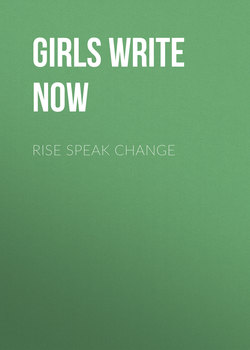Читать книгу Rise Speak Change - Girls Write Now - Страница 9
На сайте Литреса книга снята с продажи.
ОглавлениеIntroduction
TANWI NANDINI ISLAM
PHOTO CREDIT: SCOTT DUNN
The young women writers featured in this anthology are destined to become New York City’s emerging young novelists, poets, playwrights, and journalists. During my decade as a teaching artist working with teenagers across the five boroughs, I bore witness to such raw, soul-stirring wordsmiths who yielded their life’s trials and triumphs with fierce wit onto the page and the stage. They flexed their inimitable style, music, and artistry and good old drama just like any teenager.
Words change us when we speak them. Meeting the young women of Girls Write Now, I heard them speak their prose and poetry, many of them performing it for the first time. Seeing a young Bangladeshi woman and a young Pakistani woman emcee together—an event unimaginable even fifty years ago in history because of war—moved me to tears. As each young woman read her work, they articulated their imagination, personal experience and political consciousness with vulnerability and courage. I walked away with a resonant feeling: we’re going to be all right with the future in their hands.
Many of these young women survived unjust terrors we are often told to keep secret. They braved depression, bullying, sexual abuse, verbal abuse, assault, or cutting. Each time they tried to heal one wound, another wound revealed itself. And I, as their teacher, had shared these wounds, too. When I moved on to college, I embraced the rage I felt against sexism and powerful structures that oppressed people. As I got older, that anger smoldered into an inner turmoil, which I carried in secret.
My students and I learned to understand something about these secrets. We understood that secretiveness cloaks us in shame, which becomes an impenetrable fortress, a false sense of strength. But what’s really happening is shame hardening into silence. What we’re left with in the pit of our stomachs is a feeling of worthlessness. I’m not enough. This is stupid. This is never going to happen. This place is where I find myself fearing that I have no words left, only silence and shame.
Yet this is the very place we must confront ourselves when we write.
It is where we choose to rise, speak, and change injustice with our fearless imagination and work.
What you write is a gift, a collection of all the strange and beautiful and painful moments you’ve acquired over the years. When you devote yourself to an art form, you embrace a life of risk. Of being hated. Of being completely ignored or forgotten. You may be the first one in your family to be an artist, to go to college, to come out. You may not be welcome by folks you thought were your friends, your own family. You may break up with someone you love. You will start to feel as if you’re making a big mistake.
And yet, every writer must continue to look for stories embedded in every interaction and observation of the patterns, shapes, colors, smells, sounds and feels of everyday life. Take in the silence of trees, sun and stars. And remember, there is always a dark underbelly. A writer is a mediator between light and dark, hope and despair, past, present, and future. Each and every day will bring you to task. That tiny voice inside that doubts and is afraid will never, ever go away—but it will keep you honest. When you feel as though you have no words left, remember: the world needs your work.
TANWI NANDINI Islam is the author of Bright Lines (Penguin 2015), a finalist for the Center for Fiction First Novel Prize, Edmund White Debut Fiction Award, the Brooklyn Eagles Literary Prize, and the inaugural selection of Chirlane McCray, the First Lady of New York City’s Gracie Book Club. Nandini Islam is the founder of Hi Wildflower (www.hiwildflower.com), a fragrance and beauty house. A graduate of Brooklyn College MFA and Vassar College, she lives in Brooklyn, New York.
